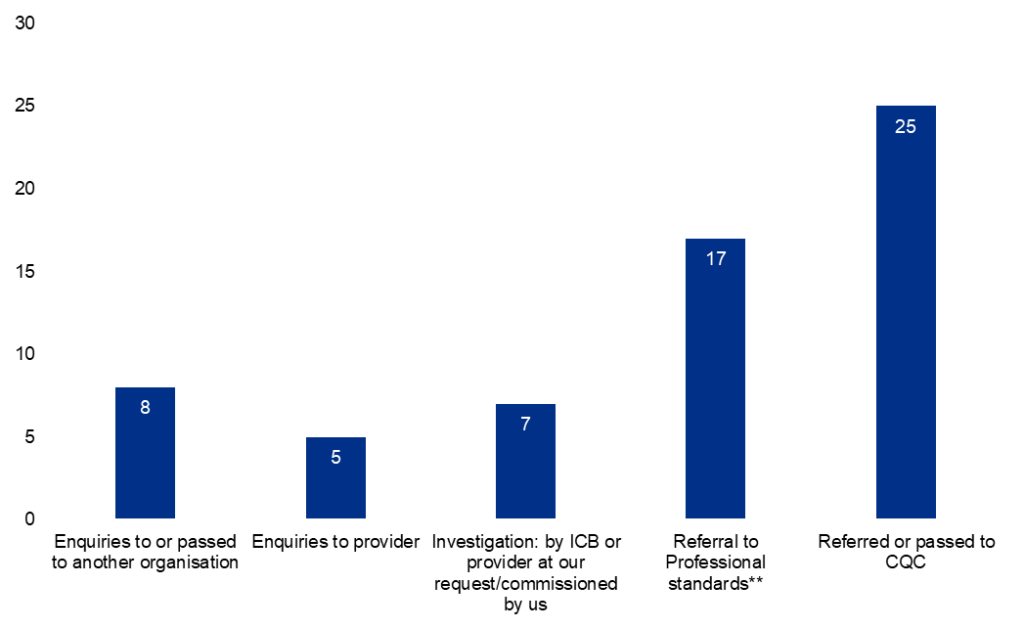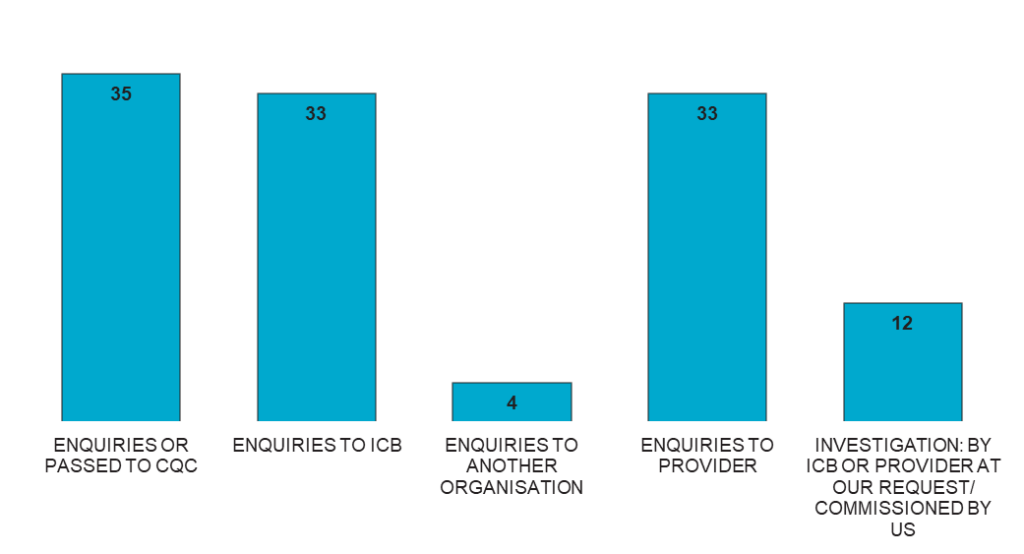Introduction
This is the NHS England report on the whistleblowing disclosures made to us under the Employment Rights Act 1996, covering April 2022 to 31 March 2023.
The Employment Rights Act 1996 sets out the circumstances in which a disclosure made by a worker will be a ‘protected disclosure’, granting the disclosing worker with the legal protections set out in that legislation.
One category of person to whom a worker can make a ‘protected disclosure’ is a ‘Prescribed Person’. ‘Prescribed Persons’ are persons or organisations who are identified by The Public Interest Disclosure (Prescribed Persons) Order 2014 (as amended) as having ‘Prescribed Person’ status.
The Order sets out for each Prescribed Person the specific matters regarding which they may receive protected disclosures.
NHS England is a Prescribed Person as defined in The Public Interest Disclosure (Prescribed Persons) Order 2014 (as amended).
Prescribed Persons with investigatory and regulatory functions, such as NHS England, can consider exercising those functions on the basis of or in response to the information that has been disclosed to them.
The government guidance for Prescribed Persons gives further details of their responsibilities: Whistleblowing: list of prescribed people and bodies.
Prescribed Persons are required to report annually on whistleblowing disclosures (disclosures) made to them by the Prescribed Persons (Reports on Disclosures of Information) Regulations 2017.
Annual reporting on whistleblowing-related activity aims to increase transparency in the way that disclosures are dealt with and to reassure people who speak up that their disclosures are taken seriously.
For the purposes of our annual reporting, we use the term whistleblowing to reflect the government guidance, but in NHS England we also refer to this as external Freedom to Speak Up, and concerns raised with us are considered under our external Freedom to Speak Up policy.
No information is included here that would enable people who have spoken up or those who are the subjects of disclosures to be identified.
NHS England’s functions and objectives
NHS England leads the NHS and sets its strategic direction in order to deliver high quality healthcare. We also support NHS organisations to work in partnership to deliver better outcomes for our patients and communities, at the best possible value for taxpayers and to continuously improve the NHS.
Listening to NHS workers who speak up is central to improving staff experience and patient care. We use information from NHS workers to inform our oversight of, and support for, NHS providers, in conjunction with other relevant information (in line with our oversight framework).
This has included sharing information with other relevant organisations and agencies, particularly the Care Quality Commission (CQC), to inform their regulation of healthcare providers.
Numbers of disclosures received
In total NHS England received 343 disclosures in this reporting period, of which 187 (55%) may be considered protected disclosures.

Whistleblowing from primary care workers
NHS workers can contact NHS England as a prescribed person with concerns about the delivery of primary medical, dental, ophthalmic, and pharmaceutical services in England.
The main issues that workers spoke up to us about in primary care organisations in 2022/23 were:
- Working conditions
- Behaviours of colleagues
- Professional standards concerns
Primary care qualifying disclosures received during 2022/23 and action taken
Between 1 April 2022 and 31 March 2023, 103 disclosures were made to us relating to primary care organisations. Of these, NHS England considered 63 to be qualifying disclosures under the Public Interest Disclosure (Prescribed Persons) Order 2014.
Actions taken by NHS England in response to disclosures relating to primary care

** NHS England » Professional Standards
NB: totals may be different to number of cases as each case may have multiple actions
We acted in 59 of these, in most cases by making further enquiries as part of our performer list function** or by looking at contractual obligations.
Usually, the information which resulted from those enquiries provided us with enough assurance that no further action was needed. Occasionally, it led to further investigation and subsequent recommendations for improvements, usually to overall quality or leadership.
We took no substantive action in 24 cases, largely because either the issue being raised was already known about and being addressed by our regional teams, we did not have sufficient detail to take any action, or it was not proportionate for us to take any action.
Whistleblowing from secondary care workers
NHS workers are able to contact NHS England with concerns about the quality, financial and operational performance of NHS trusts and NHS foundation trusts (these organisations provide what we call ‘secondary care’).
The main issues that workers spoke up to us about in these organisations in 2022/23 were:
- patient safety (regarding clinical practice)
- conduct of executive directors of NHS trusts and foundation trusts
- governance at NHS trusts and foundation trusts
- individual employment matters (which are outside our remit).
Secondary care qualifying disclosures received during 2022/23 and action taken
Between 1 April 2022 and 31 March 2023, 219 disclosures were made to us relating to secondary care organisations. Of these, NHS England considered 115 to be qualifying disclosures.
Actions taken by NHS England in response to disclosures relating to secondary care

*total may be different to number of cases as each case may have multiple actions
We acted in 69 of these, in most cases by making further enquiries as part of our oversight and support to providers in line with our operating framework. Usually, the information which resulted from those enquiries provided us with enough assurance that no further action was needed.
Occasionally, it led to further investigation, either at our request or commissioned by us, and subsequent recommendations for improvements usually to overall governance, quality or leadership.
We took no substantive action in 46 cases, largely because the issue being raised was already known about and being addressed by our regional teams, or in some cases we did not have sufficient detail to take action.
In some cases, we considered that local resolution would be the most appropriate action and so encouraged workers to use their internal speaking up processes.
Whistleblowing for integrated care board workers
Following the creation of integrated care boards (ICBs) in July 2022, NHS workers began to contact NHS England with concerns about the financial, oversight and governance performance of ICBs.
During 2022/23 NHS England was not a prescribed body in respect of matters concerning ICBs (but that has now changed from 6 November 2023, when NHS England became a prescribed body for matters related to ICBs).
We still, however, took concerns regarding these bodies seriously when we received concerns and consequently, we are voluntarily including such disclosures and our activity in response to such disclosures within this report.
The main issues that workers spoke up to us about in these organisations in 2022/23 were:
- the conduct of board members of ICBs
- individual employment matters (which are outside our remit).
Between 1 July 2022 and 31 March 2023, 10 disclosures were made to us relating to ICBs. We took further action including making enquiries to the ICBs or other organisations in six of these cases.
Reasons for whistleblowing to NHS England
While most workers who speak up in the NHS will do so within their employing organisations, there are a range of reasons why workers might wish to speak up to NHS England instead of within their own organisation.
Where possible we try to capture this information by asking workers why they have come to NHS England to speak up. This helps us to understand the barriers workers are facing to speaking up locally and to support NHS organisations to improve their own speaking up arrangements.

Helping organisations to improve
Underlining the importance of Freedom to Speak Up (FTSU) during another pressured year for the NHS, we provided 21 NHS trusts, foundation trusts and primary care organisations with support to improve their FTSU arrangements.
This included reviewing board papers; supporting executive FTSU leads; analysing data; making recommendations for improvement and running board development workshops.
NHS England also worked with the National Guardian’s Office to produce an updated national policy and updated guidance for NHS providers on their speaking up arrangements NHS England » Freedom to speak up national policy, guidance and planning tool.

